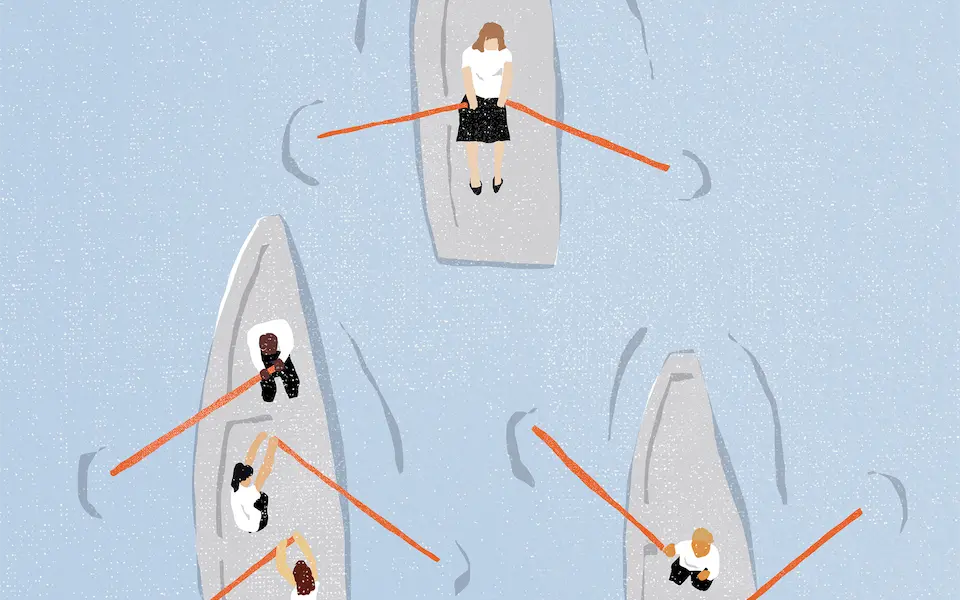
Virtual First, Passion economy
How introverts can take the lead in remote work
Published on August 25, 2021
Like many introverts, Jenn Granneman chose to work in isolation long before the pandemic made it mandatory. Before becoming author of The Secret Lives of Introverts and founder of IntrovertDear.com, she’d spent years trying to find traction in traditional office spaces.
“I was steadily working away, not really saying much,” she recalls. “Often my work would kind of fly under the radar, even though I was showing up every day, putting in my best effort, and trying not to waste time by hanging out at other people's desks and chatting. It often felt like the loudest voices in the room got the most attention.”
When Granneman had comments or questions in big meetings, she often felt too nervous to speak up. Instead, she’d wait until after the meeting to talk to her boss. But she found that following up by email had less impact than voicing ideas during the meeting.
“I think we've all been in that situation where a meeting gets derailed by one or two people's concerns,” she says. “I noticed it tended to be the same few people over and over who could take over the meeting and not leave room for the quieter people to speak up.”
One day, Granneman had an epiphany that her way of working wasn’t wrong—it just wasn’t supported or appreciated in an office setting. Her preference for solitude felt like a disadvantage as a teacher, journalist, and marketer. But once she escaped the constraints of 9-to-5 life, working in solitude became her strength.
“Learning about my own introversion helped me not feel so ‘alone’ or ‘weird’ in my introverted quirks,” she recalls. “I was living with a very extroverted roommate, dating a very extroverted guy, and teaching, which is a pretty extroverted job. I wanted to write about what it was like to be an introvert living in an extrovert’s world.”
For the first two years, she wrote the blog anonymously because, like a lot of introverts, she was wary of attention. “I started it for myself because I wanted to connect with other introverts,” she says. “Then I had a realization that there's nothing wrong with being an introvert. I was excited about it, and when you're excited about something, you want to tell other people. I wanted to share this empowering knowledge with others.”
Her enthusiasm resonated with loyal fans. Today, IntrovertDear.com is the largest online community and publication for introverts in the world—and the blog’s success has come at just the right time, as many introverts are discovering the opportunities that today’s complex work landscape brings.
The upside of solitude
As countless articles have illuminated, the rise of remote work has suited the lives of introverts. Of course, there’s the part where you aren’t required to hang out with other people all day—but the benefits go deeper than that.
One day, she had an epiphany that her way of working wasn’t wrong—it just wasn’t appreciated in an office setting.
In a recent New York Times survey, remote workers echoed Granneman’s appreciation for relief from the “squeaky wheels” who interrupt and drown out coworkers during meetings. Much work that used to be performed in group meetings has now migrated to shared documents, where hierarchy fades and introverts have a chance to be heard in ways they rarely were in the office. In these spaces, an important shift has been laid bare. It’s not the volume of the voice; it’s the strength of the idea.
This is a huge win for people who prefer to take time gathering their thoughts before sharing them. And for those who don’t have kids—or at least have well-insulated home office set-ups—WFH may offer more opportunities for introspection and reflection.
“There are few interruptions,” says Granneman. “I’m in charge of my own schedule and environment, which makes me happy. There’s no small talk with coworkers, so I can be more productive. I can work at times and in ways that benefit me, such as closing my office door and concentrating alone, or reading for 30 minutes while I drink my coffee before I start my work day.”
In other words, there’s more freedom for introverts to find focus—a resource that was in high demand, but short supply in the era of open-office plans. It’s not only that introverts are able to access more focused time, though. They’re also able to use that focus to produce work of greater consequence. Less small talk, more impact.
In some cases, as Jenn has found, the work that really matters to them may not be what they’re doing in their current job. It may require striking out on their own, as she did herself.
There’s never been a better time to be an introverted entrepreneur
Introverts are often the quiet force behind great businesses. But getting started takes a lot of up-front work that can be intimidating. Lately, though, online tools have been lowering the barrier of entry to making money on your own terms.
As discussed on an Introvert, Dear podcast, you can now register your business at sba.gov or legalzoom.com or set up a Stripe account to accept credit cards without having to slog through traffic, wait in line, or deal with face-to-face interactions.
There’s more freedom for introverts to find focus—a resource that was in high demand, but short supply in the era of open-office plans.
And rather than relying on traditional paths to VC investment that may favor extroverts, new platforms like Patreon, Substack, and Shopify allow fans to directly support the creators they love. As we learned from author Adam Davidson, the key to connecting with people in the Passion Economy is building a relationship with the ones who most value the specific skills you offer. Thanks to social media, creators now have the potential to find 1,000 True Fans without leaving home.
Granneman says starting a business can be an excellent choice for self-motivated introverts who enjoy working independently. But before jumping into entrepreneurship, she advises thinking about what kind of work makes you light up.
“If you’re an introvert, that probably means solitary, creative, or analytical tasks will energize you, whereas schmoozing, sales, and public speaking will drain you,” she says.
When you’re a business owner, though, sometimes you have to do a little of both. That’s why she suggests building a business around what works with your introversion rather than against it.
“For example, are you really good at writing engaging social media posts, but hate performing on video? Play to your introvert strengths,” she suggests. “There’s a reason I started out writing blog posts rather than vlogging!”
Though Granneman didn’t have ambitions to start her own business when she began Introvert, Dear, she eventually realized she could pay herself to work on her website by monetizing it. Banner ads on the site are now her primary source of income, which is supplemented by affiliate relationships for online courses, books, and therapy services.
She knew she would be able to put more time and effort into Introvert, Dear if she left her day job, but chose to make that move slowly and methodically to minimize risk.
“Introverts, who tend to be cautious and look before they leap, will probably feel more comfortable doing what I did: saving enough money to cover six months of expenses before quitting my day job, which gave me a financial buffer as my business grew,” she recalls.
She also waited until she could cover her most basic monthly expenses, like rent and groceries. “Knowing I had a financial ‘runway’ helped me feel calm when I quit my job, and it allowed me to actually focus on growing my business without fear.”
While going out on your own is inherently scary, it’s the sort of calculated risk that’s perhaps never felt safer for introverts. And after all, solopreneurship plays into a strength many introverts have tapped into and grown in the past year: self-sufficiency. As many folks have found, we’re capable of way more than we ever thought.



